Key takeaways:
- Whistleblowing is driven by a sense of responsibility for patient safety, often leading to personal and professional risks for the whistleblower.
- Ethical standards are essential in surgical research to ensure the integrity of studies and protect participants from harm.
- Open communication and support systems are crucial for fostering a culture of transparency and accountability in research environments.
- Whistleblowing can initiate significant changes in institutional practices, leading to improved ethical guidelines and a commitment to honesty in research.
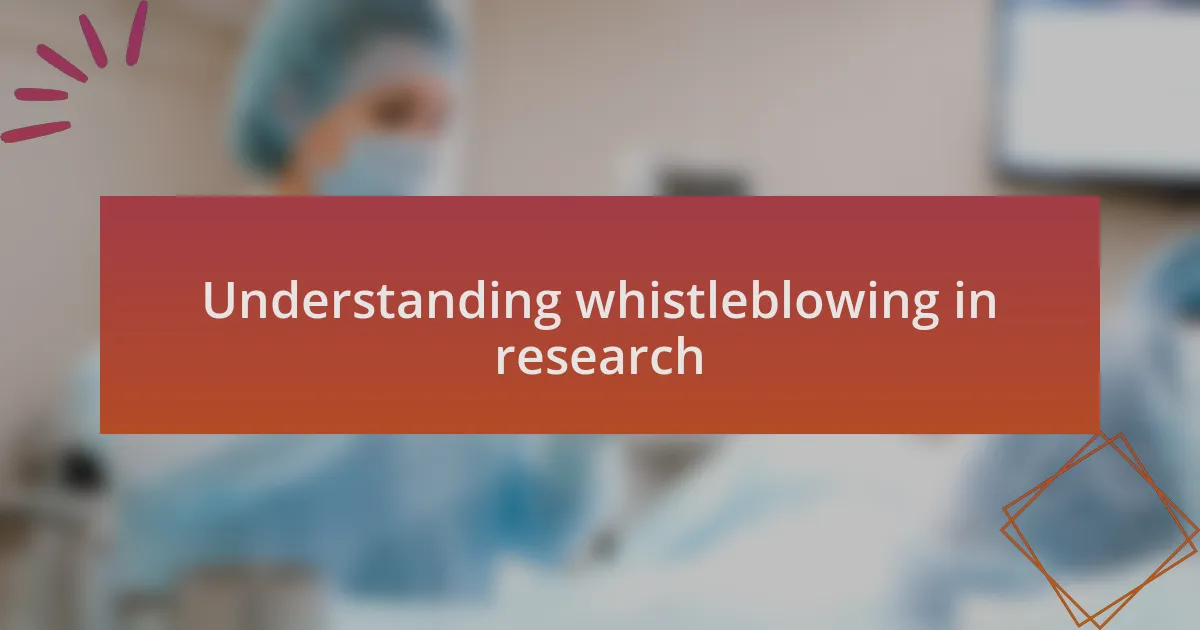
Understanding whistleblowing in research
Whistleblowing in research is a complex yet crucial aspect that often gets overlooked. I remember a time during my early career when a colleague discreetly shared concerns about data manipulation in a study. It made me question how many others might hesitate to speak up, fearing consequences that could impact their careers or even the integrity of their work.
In my experience, the motivation to whistleblow frequently stems from a deep sense of responsibility. I once knew a researcher who chose to report unethical practices, driven by a genuine concern for patient safety. This made me realize the emotional weight that comes with such an action—it’s not just about the act of reporting; it’s about the lives that could be affected by the choices made behind closed doors.
The decision to blow the whistle can also lead to isolation. I’ve seen whistleblowers face backlash, leaving me wondering: How can we create an environment that encourages transparency without fear? It’s vital for institutions to foster a culture of open dialogue, allowing individuals to express concerns with the assurance that their voices will be heard and valued.
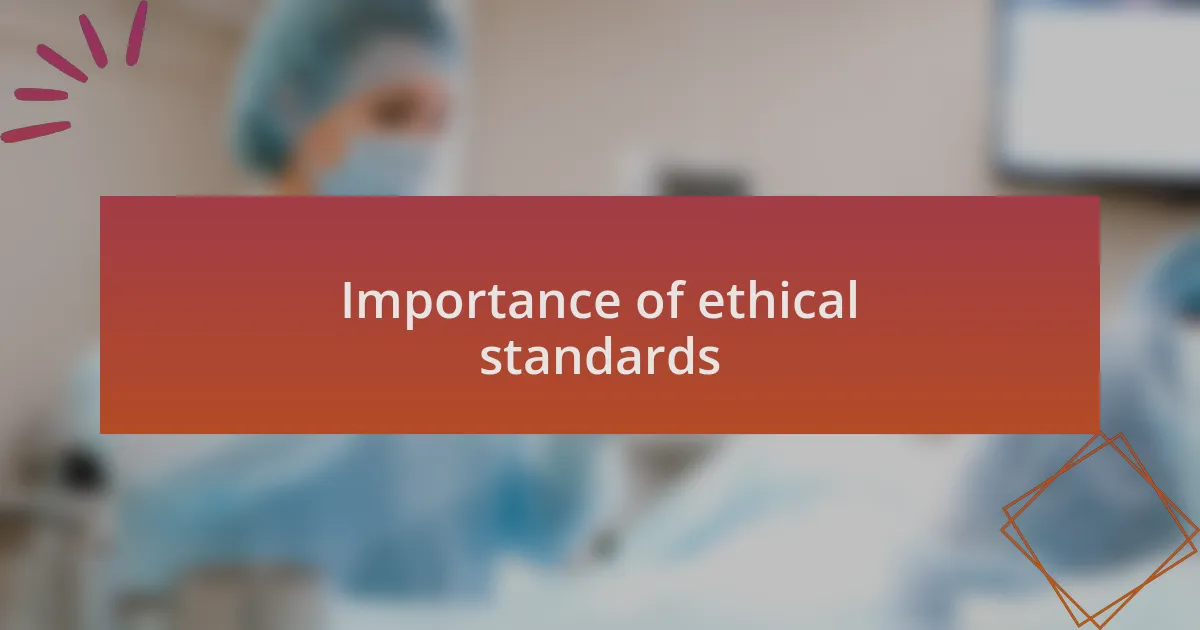
Importance of ethical standards
Ethical standards in surgical research are fundamental to ensuring credibility and trust. I recall a particularly troubling study that turned out to have serious ethical breaches regarding informed consent. It struck me how such violations not only undermined the integrity of the research but also harmed patients who mistakenly believed they were participating in a reputable study.
When I think about the implications of unethical practices, I can’t help but feel a sense of urgency. Many researchers may face pressure to cut corners, but maintaining ethical standards isn’t just a checklist item; it’s about prioritizing the safety and dignity of participants. How can we expect advancements in medicine if the very basis of our research is rooted in compromise?
In my own practice, adhering to ethical standards has cultivated a sense of pride and accountability. I once had to confront a senior colleague about their intentions with a particular trial, which was an uncomfortable but necessary conversation. In moments like that, I’ve learned that ethics isn’t just policy; it’s the heart of our work that safeguards the future of surgical innovation and patient welfare.
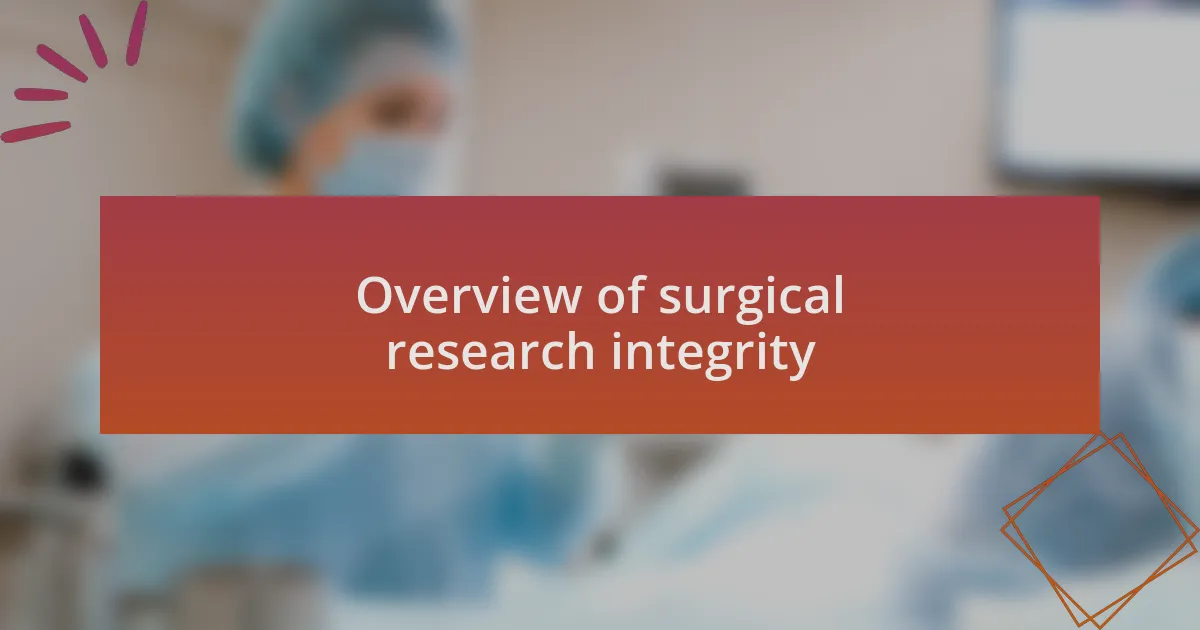
Overview of surgical research integrity
Surgical research integrity hinges on honesty and transparency. Throughout my career, I’ve witnessed firsthand how the pressure to publish can lead researchers to manipulate data or cherry-pick results to fit a desired narrative. It raises a poignant question: what good is a breakthrough if it’s built on a foundation of deceit? This thought weighs heavily on me, knowing that patient safety and trust are at stake.
Delving deeper into this topic reveals that integrity isn’t just about avoiding misconduct; it’s also about fostering a culture that encourages accountability. I remember a time when my team faced a dilemma in a clinical trial. We had conflicting results that didn’t match our expectations, and the temptation to gloss over the discrepancies was palpable. Instead, we chose transparency, and the ensuing discussions led to unexpected improvements in our methodology. That experience underscored for me how integrity in research fuels not just ethical practice but also innovation.
Moreover, the repercussions of overlooking research integrity are far-reaching. I often ponder how a single compromised study can ripple into public policy and clinical guidelines, ultimately affecting countless patients. It’s a reminder that each piece of research contributes to a larger narrative about healthcare, one that must be truthful and reliable. As researchers, we carry the responsibility not only to our profession but also to society, ensuring that every surgical advancement is founded on solid ethical ground.
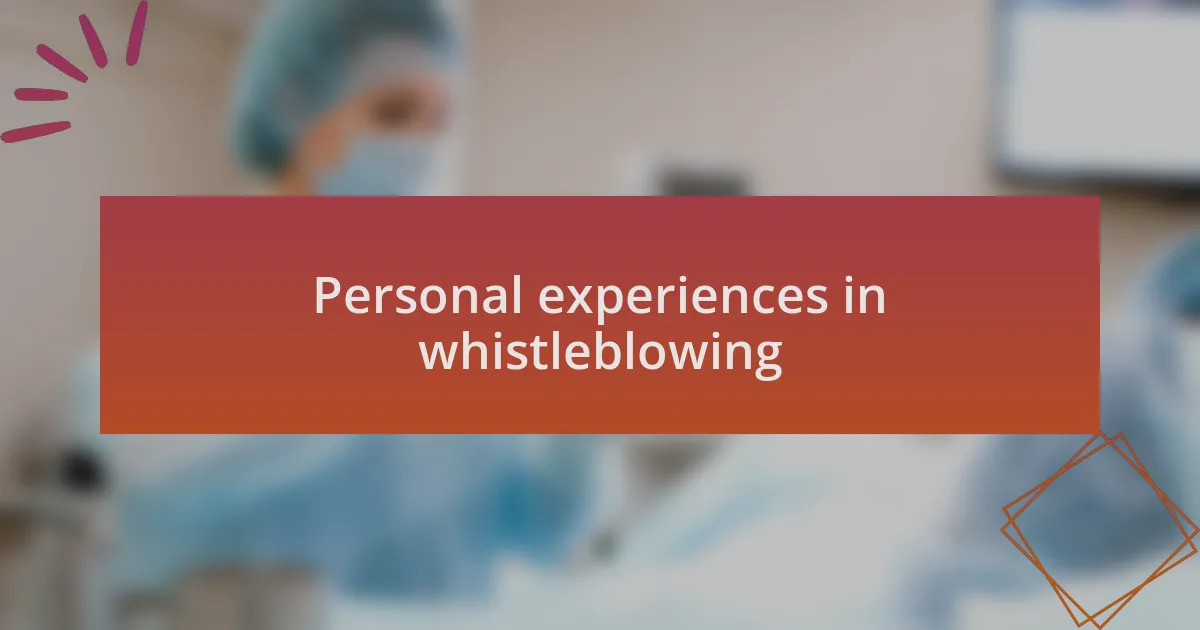
Personal experiences in whistleblowing
Reflecting on my experience with whistleblowing, I remember a turning point during a research project where I discovered discrepancies in data reporting. It was a gut-wrenching moment; I knew that by speaking up, I would face backlash from colleagues who were heavily invested in the outcome. Yet, I felt an overwhelming obligation to prioritize patient safety above my own comfort. The choice between silence and integrity became clear.
There was a particular instance when one of my colleagues, who’s still a good friend, downplayed adverse effects in their findings. I remember sitting down with them, feeling a mix of concern and camaraderie. I asked, “What if this affects patient lives?” That conversation, albeit difficult, led to a reassessment of the data and ultimately a decision to be more honest in publishing our results. It taught me that sometimes, a direct conversation can bridge the gap between loyalty to a colleague and loyalty to the truth.
As the process unfolded, I experienced a swirl of emotions—fear, anxiety, but also a sense of empowerment. Taking that leap in whistleblowing reinforced my belief that ethical integrity is essential in our field. I realized that being a whistleblower is not just about pointing out wrongs; it’s about advocating for a culture where truth prevails and the right decisions are made, even when they are unpopular. What greater responsibility do we have than ensuring safety for those who depend on our work?
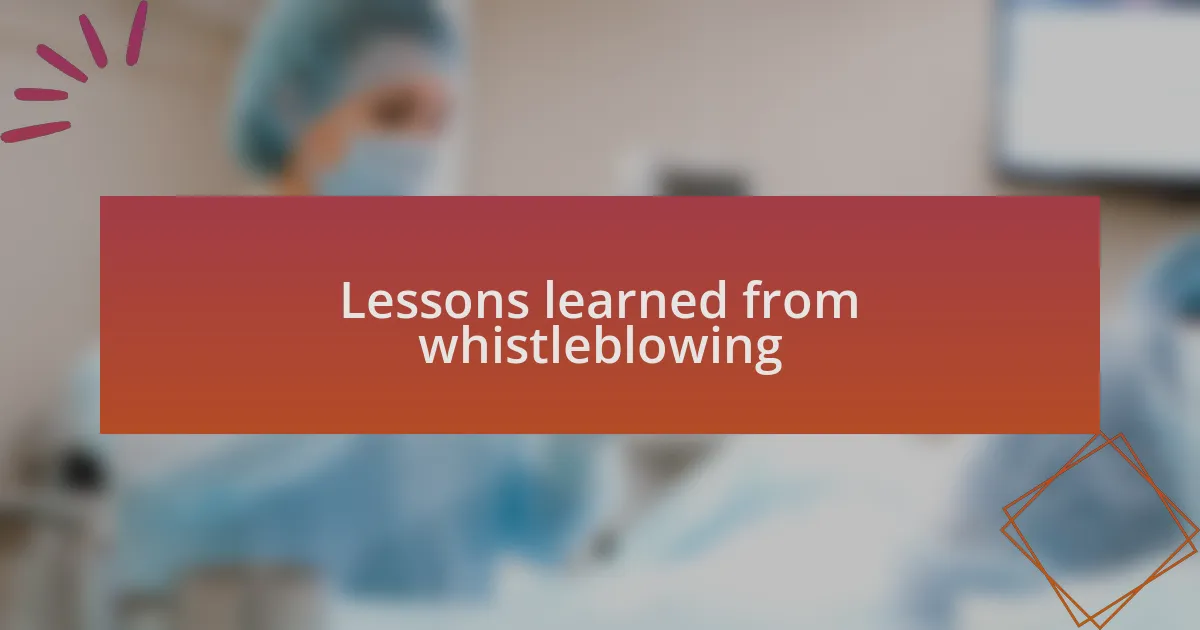
Lessons learned from whistleblowing
One key lesson I learned from whistleblowing is the importance of clear communication. Early in my career, I confronted a situation where a serious oversight in a surgical technique was brushed aside. A simple team meeting, where I expressed my concerns directly, transformed an adversarial situation into an opportunity for collaborative solutions. This taught me that speaking up can create an environment where everyone feels safe to share their thoughts, ultimately fostering better practices.
Another significant realization was the necessity for unwavering support systems. After voicing my concerns, I often felt isolated, questioning if the trust I had in my values was worth the potential fallout. I remember reaching out to a mentor who had faced similar dilemmas; our conversations were invaluable. They reminded me that standing for the truth often requires a strong support network, reinforcing the idea that integrity thrives when we lean on one another.
Furthermore, I discovered that whistleblowing can evoke profound emotional responses, both for myself and those around me. When I informed my superior about manipulative practices in data collection, I was met with both gratitude and resistance. It struck me then that the emotional weight of such decisions transcends personal ramifications; they resonate throughout entire teams and institutions. Does the fear of backlash overshadow the moral imperative to protect patient welfare? I’d argue it shouldn’t, and each time we choose honesty, we elevate our commitment to the greater good.
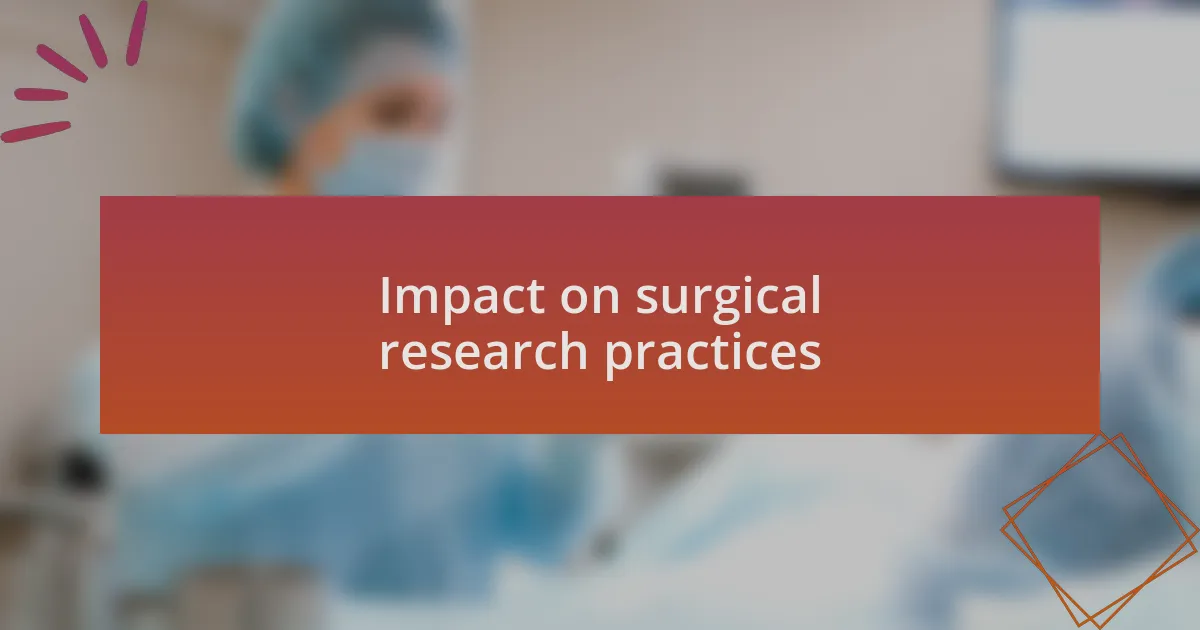
Impact on surgical research practices
Whistleblowing has undeniably reshaped surgical research practices by bringing ethics to the forefront. In one instance, I observed colleagues disregarding ethical guidelines in favor of expedited results. After addressing my concerns, it sparked a rigorous review process that ultimately led to revised protocols ensuring patient safety and integrity in research. It made me realize that challenging the status quo can often lead to fundamental improvements.
In my experience, the impact of whistleblowing extends beyond individual practices; it influences the culture of research institutions. I remember a time when my disclosure initiated mandatory ethics training for new researchers. This initiative not only altered how surgical studies were conducted but also fostered an environment that rewarded transparency. Isn’t it interesting to consider how one voice can cascade into a broader cultural shift?
Moreover, I’ve often reflected on the hesitance many feel when confronted with ethical dilemmas in research. When I chose to speak out, I was consumed with trepidation, but I found solace in knowing that my actions could instigate necessary change. In hindsight, it becomes clear: whistleblowing doesn’t just affect a single project; it can redefine standards for surgical research practices as a whole, promoting a climate of accountability that ultimately benefits everyone involved.